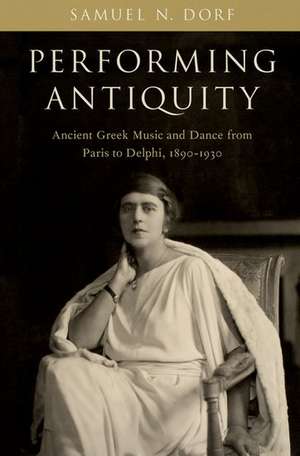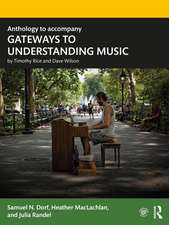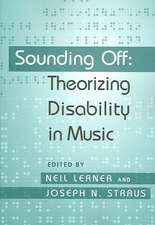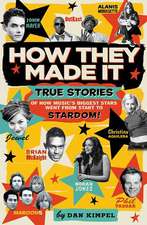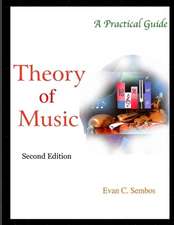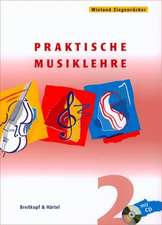Performing Antiquity: Ancient Greek Music and Dance from Paris to Delphi, 1890-1930
Autor Samuel N. Dorfen Limba Engleză Paperback – 17 ian 2024
| Toate formatele și edițiile | Preț | Express |
|---|---|---|
| Paperback (1) | 230.40 lei 11-16 zile | |
| Oxford University Press – 17 ian 2024 | 230.40 lei 11-16 zile | |
| Hardback (1) | 494.04 lei 32-37 zile | |
| Oxford University Press – 20 dec 2018 | 494.04 lei 32-37 zile |
Preț: 230.40 lei
Preț vechi: 272.54 lei
-15% Nou
Puncte Express: 346
Preț estimativ în valută:
44.09€ • 46.12$ • 36.62£
44.09€ • 46.12$ • 36.62£
Carte disponibilă
Livrare economică 03-08 martie
Preluare comenzi: 021 569.72.76
Specificații
ISBN-13: 9780197766576
ISBN-10: 0197766579
Pagini: 240
Ilustrații: 37 illustrations
Dimensiuni: 226 x 160 x 25 mm
Greutate: 0.3 kg
Editura: Oxford University Press
Colecția OUP USA
Locul publicării:New York, United States
ISBN-10: 0197766579
Pagini: 240
Ilustrații: 37 illustrations
Dimensiuni: 226 x 160 x 25 mm
Greutate: 0.3 kg
Editura: Oxford University Press
Colecția OUP USA
Locul publicării:New York, United States
Recenzii
Dorf considers carefully the first Delphic hymn and the way Théodore Reinach edited it... this book sheds light on a particular small world of scientists and artists, who shared a passion for Antiquity and who regularly met in the Parisian salons... well documented and stimulating analyses.
Recommended.
His book assembles an archive and lends it voice, allowing a history to sing. This performance shocks me — to action, to activism, and to repair.
The past cannot be revived. Lost works are lost, which is a good thing, Samuel Dorf argues, because they can only live again in the imagination. New performances feed on the fears, the hopes, and the love of musicians, dancers, and scholars alike. Dorf's conclusion is sublime, his chapter on Greek music and dance in queer salons deeply affecting. Plus his reflections on the history of musicology and the nature and purpose of archival research prove unsettling. A provocative, unique, and essential read.
Deeply engaged, fascinating portrait of the Belle Epoque attraction to the ancient world. Here the star is not Isadora Duncan, a shadowy presence, but an interconnected group of enthusiasts linked by a similar passion for modern reenactments. Framed by the scholarly interests and agendas of the Reinach brothers, Salomon and Théodore, the book explores their collaborations with composers Gabriel Fauré and Maurice Emmanuel, Natalie Barney's backyard, Sapphic performances for tout Paris, and the first Delphic Festivals in Greece (late 1920s). One can't help but sense a little of the author in these charming, empathetic stories of archival 'voyeurism.' As insightful and sophisticated as pleasurable to read with its rare, period photographs.
Like a sudden aerolith alighting in some historian's surprised garden, Dorf's glowing book gives us an alternative history of turn-of-the-century Europe filled with earnest lesbians and archaeologists, hidden pianos in neo-Delian villas, visionary dancers, and an exuberant arc of musical and artistic fantasy about ancient Greece that returns us to the wonder of a period a hundred years behind us, yet which still invites us to ask who we are and what we love.
Recommended.
His book assembles an archive and lends it voice, allowing a history to sing. This performance shocks me — to action, to activism, and to repair.
The past cannot be revived. Lost works are lost, which is a good thing, Samuel Dorf argues, because they can only live again in the imagination. New performances feed on the fears, the hopes, and the love of musicians, dancers, and scholars alike. Dorf's conclusion is sublime, his chapter on Greek music and dance in queer salons deeply affecting. Plus his reflections on the history of musicology and the nature and purpose of archival research prove unsettling. A provocative, unique, and essential read.
Deeply engaged, fascinating portrait of the Belle Epoque attraction to the ancient world. Here the star is not Isadora Duncan, a shadowy presence, but an interconnected group of enthusiasts linked by a similar passion for modern reenactments. Framed by the scholarly interests and agendas of the Reinach brothers, Salomon and Théodore, the book explores their collaborations with composers Gabriel Fauré and Maurice Emmanuel, Natalie Barney's backyard, Sapphic performances for tout Paris, and the first Delphic Festivals in Greece (late 1920s). One can't help but sense a little of the author in these charming, empathetic stories of archival 'voyeurism.' As insightful and sophisticated as pleasurable to read with its rare, period photographs.
Like a sudden aerolith alighting in some historian's surprised garden, Dorf's glowing book gives us an alternative history of turn-of-the-century Europe filled with earnest lesbians and archaeologists, hidden pianos in neo-Delian villas, visionary dancers, and an exuberant arc of musical and artistic fantasy about ancient Greece that returns us to the wonder of a period a hundred years behind us, yet which still invites us to ask who we are and what we love.
Notă biografică
Dr. Samuel N. Dorf is a musicologist and dance historian. His research areas include intersections between musicology and dance studies and the history of technology, studies of antiquity, reception studies, queer studies, and the history of performance practice. He teaches at the University of Dayton.
